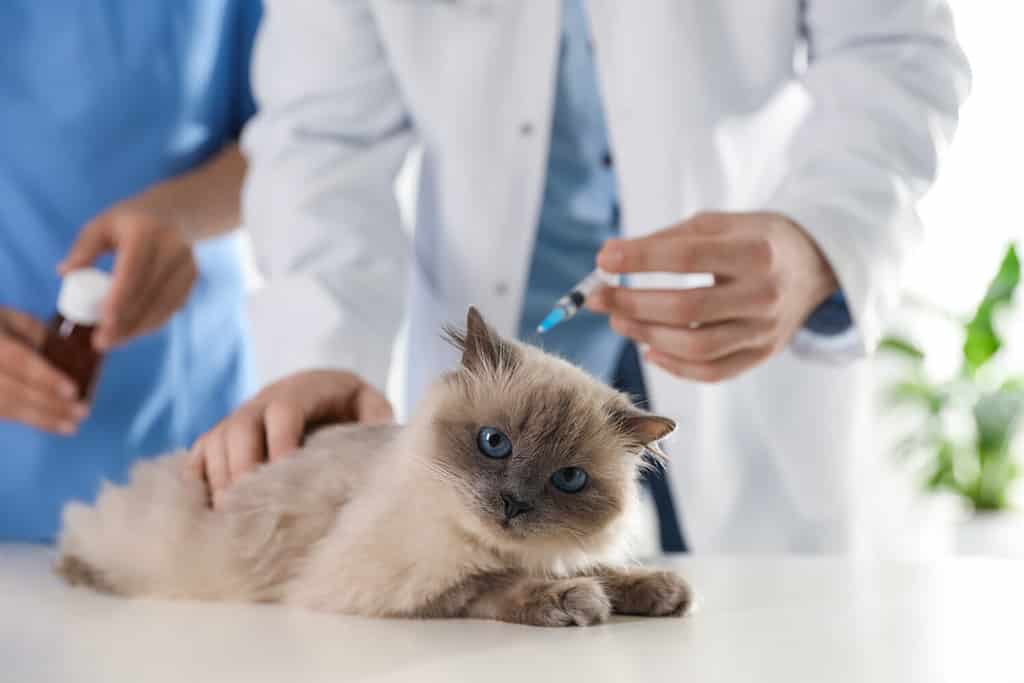Birman cats live for around 12 to 16 years. However, it does depend on the exact cat and breeder. Some cats live closer to nine years. The average seems to be about 14 years, according to most accounts. Some may reach closer to 20 years with good health and proper veterinary care.
Factors That Affect a Birman Cat’s Lifespan
Many factors affect a Birman cat’s lifespan. Genetics is the main factor. Some cats are predispositioned to health issues that will shorten their lifespan, for instance. Others are very healthy and may not even develop health issues until later in life.
It’s important to purchase cats from responsible breeders only. Choosing quality breeding can help minimize the risk of inheritable health problems.
How you care for your cat also matters, of course. You should provide your Birman cat with a high-quality diet to meet their nutritional needs and prevent nutritional problems. Even minor nutritional deficiencies can lead to a suppressed immune system, causing your cat to get sick rather early.
Preventative care is also important. Yearly checkups are essential to your cat’s health. Your vet will provide vaccinations to prevent diseases and perform some basic health assessments. Kittens need even more checkups as they are still growing and require more vaccinations.
Stress can also take years off of your cat’s lifespan. Cats are very susceptible to stress and may find things stressful that we may not. For instance, even slight changes in routine can make your cat stressed.
You cannot always prevent your feline from becoming stressed. Sometimes, changes must be made. However, we always recommend reducing your cat’s stress when possible. Cats that seem overly stressed about small things may need veterinary attention.
How Do Birman Cats Stack Up Against Other Cat Breeds

Vet care is important to ensure your cat lives as long as possible. Vaccines are required to prevent a few serious conditions.
©New Africa/Shutterstock.com
Birman cats typically live about average for a pet cat. The average lifespan of a domestic cat in the United States is around 13 to 14 years, which also happens to be the average age of a Birman cat.
Of course, some Birman cats live longer than this average, and these felines could easily fall into the “long-lived” category. Other long-lived breeds include:
Maine Coons, Norwegian Forests cats, and Russian Blues have about the same lifespan as a Birman cat (around 12-16 years). These cats live about the average lifespan of any cat.
Some cat breeds don’t live as long, of course. These include Persians, Exotic Shorthairs, and Himalayan cats. These breeds live closer to 9 or so years, which is a few less than the average Birman cat.
Simply put, compared to other cat breeds, Birman cats have a pretty average lifespan. They aren’t the longest-lived cats out there but aren’t the shortest-lived.
Common Birman Cat Health Problems
While Birman cats are generally healthy, they can be prone to several health issues. One of the most common is hypertrophic cardiomyopathy, which is the most common form of heart disease in most cat breeds. This condition occurs when the heart muscle thickens, leading to heart failure, blood clots, and similar issues.
In many cases, this condition is asymptomatic until it gets very serious. Sometimes, cats don’t show any symptoms at all before suddenly dying. Many cats that die suddenly are likely affected by this heart condition.
Birman cats are also prone to polycystic kidney disease, an inherited condition that causes cysts to form in the kidneys. Eventually, it does lead to death. This condition is completely genetic, which means that cats are born with it. Genetic testing can eliminate the chance of a feline being affected. (Again, this is why choosing a quality breeder is important.)
Birman cats are prone to dehydration, just like most other types of cats. Cats evolved to get most of their fluids from their prey. Cats may not drink enough to meet their hydration needs if fed solely dry food. Dehydration can cause a range of health issues, including UTIs.
Some Birman cats also develop hypotrichosis, which is a genetic condition that causes hair loss. Luckily, this condition is painless and not known to cause complications. However, it does make the cat’s skin more prone to sun damage, so sunscreen must be applied when the cat is outside.
The photo featured at the top of this post is © Liudmila Chernetska/Shutterstock.com
Thank you for reading! Have some feedback for us? Contact the AZ Animals editorial team.






